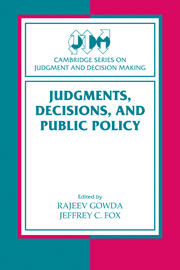Book contents
- Frontmatter
- Contents
- Contributors
- Acknowledgments
- Introduction
- Part I The Fundamentals of Behavioral Decision Theory
- Part II Economic Applications and Contrasts
- Part III Applications to Political and Legal Processes and Institutions
- Part IV Other Policy Applications
- 10 Enhancing the Effectiveness of Innovative Policy Instruments: The Implications of Behavioral Decision Theory for Right-to-Know Policies
- 11 Behavioral Perceptions and Policies Toward the Environment
- 12 The Affect Heuristic: Implications for Understanding and Managing Risk-Induced Stigma
- 13 Enlarging the Pie by Accepting Small Losses for Large Gains
- Part V Commentary and Cautionary Note
- Index
11 - Behavioral Perceptions and Policies Toward the Environment
Published online by Cambridge University Press: 11 January 2010
- Frontmatter
- Contents
- Contributors
- Acknowledgments
- Introduction
- Part I The Fundamentals of Behavioral Decision Theory
- Part II Economic Applications and Contrasts
- Part III Applications to Political and Legal Processes and Institutions
- Part IV Other Policy Applications
- 10 Enhancing the Effectiveness of Innovative Policy Instruments: The Implications of Behavioral Decision Theory for Right-to-Know Policies
- 11 Behavioral Perceptions and Policies Toward the Environment
- 12 The Affect Heuristic: Implications for Understanding and Managing Risk-Induced Stigma
- 13 Enlarging the Pie by Accepting Small Losses for Large Gains
- Part V Commentary and Cautionary Note
- Index
Summary
There is a strong relationship between the ways people think about the behavior of nature – the probabilities, rewards, and penalties it metes out – and how we as a society confront environmental problems. Many characteristics of environmental problems stimulate the side of people's perceptions and responses that a band of psychologists and economists have recently worked together to describe. Environmental concerns frequently involve small and ill-defined probabilities, at times incorporating scenarios that are hard to envision. Many decisions of the potentially gravest import, such as destruction of the ozone layer or alteration of the global climate, are unique situations; they have no precedents and offer no repeat plays. Experts often disagree significantly about environmental problems and about the models to employ in thinking about them. The measuring rod of money, so helpful in dealing with many policy concerns, is absent or at best one step removed in measuring environmental outputs. Such outputs are not traded on markets, and people have difficulty making trade-offs between them and other valuable commodities. These conditions challenge wise choice. In this hostile soil for rationality, behavioral decision can flourish. In an unkindly moment, we may liken behavioral decision to an alien plant. To the rationalist, it is a weed in the garden where only rationality should bloom. To the realist, it is better to understand this plant's anatomy, learning how to live with it, even harvesting it at times, since eradication seems unlikely. Realists recognize that certain conditions make behavioral decision virtually inevitable. Environmental policy offers such conditions.
- Type
- Chapter
- Information
- Judgments, Decisions, and Public Policy , pp. 265 - 302Publisher: Cambridge University PressPrint publication year: 2001



